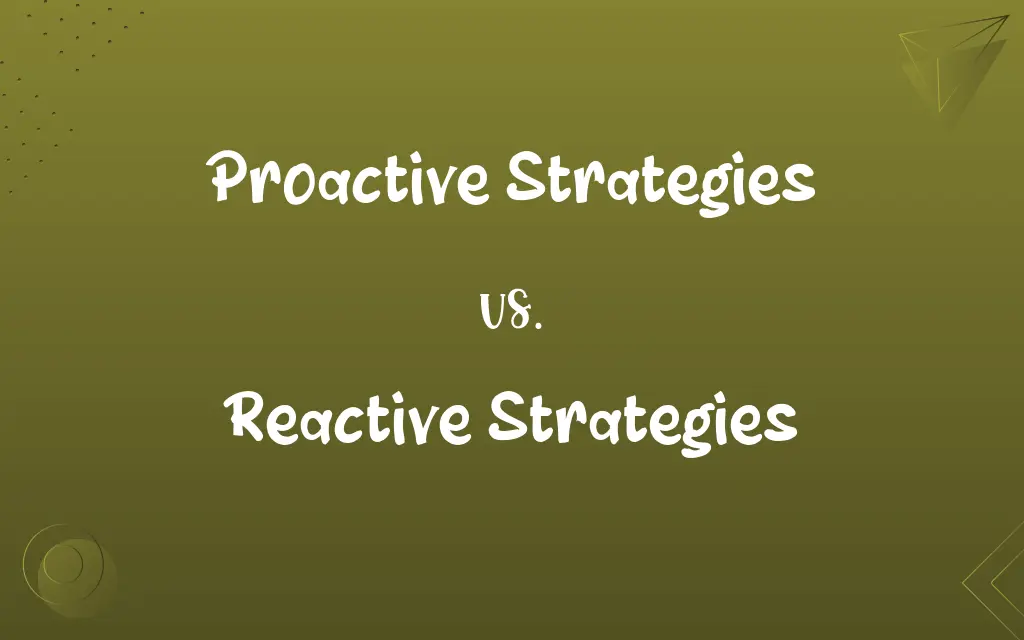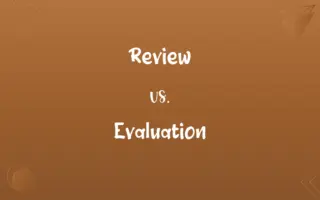Proactive Strategies vs. Reactive Strategies: Know the Difference

By Shumaila Saeed || Published on February 3, 2024
Proactive strategies involve planning and acting in advance to prevent problems, while reactive strategies involve responding to situations after they occur.

Key Differences
Proactive strategies focus on preventing future problems through foresight and planning, whereas reactive strategies address issues as they arise. Both approaches have their place in effective management.
Shumaila Saeed
Feb 03, 2024
In a business context, proactive strategies might involve market research and innovation to stay ahead, while reactive strategies could include responding to competitor moves or market changes. Both strategies are essential for adaptability and sustainability.
Shumaila Saeed
Feb 03, 2024
Proactive strategies often require more initial effort and resources to anticipate potential challenges, whereas reactive strategies might seem more resource-efficient but can lead to short-term solutions. Balancing both is key to long-term success.
Shumaila Saeed
Feb 03, 2024
Proactive strategies are about creating opportunities and preparing for potential threats, while reactive strategies often involve solving problems and mitigating damage. Both require different mindsets and skill sets.
Shumaila Saeed
Feb 03, 2024
Examples of proactive strategies include regular training and skill upgrades, whereas examples of reactive strategies include troubleshooting customer complaints or technical issues. Both are crucial for maintaining business continuity and growth.
Shumaila Saeed
Feb 03, 2024
ADVERTISEMENT
Comparison Chart
Resource Allocation
Often requires more initial resources
May seem more resource-efficient
Shumaila Saeed
Feb 03, 2024
Examples in Business
Market research, innovation, skill development
Troubleshooting, responding to competitors
Shumaila Saeed
Feb 03, 2024
Outcome
Long-term benefits, reduced risks
Quick solutions, potential short-term focus
Shumaila Saeed
Feb 03, 2024
ADVERTISEMENT
Proactive Strategies and Reactive Strategies Definitions
Proactive Strategies
Developing contingency plans for various scenarios.
Proactive strategies include creating a disaster recovery plan.
Shumaila Saeed
Jan 19, 2024
Reactive Strategies
Implementing solutions after an issue has emerged.
Reactive strategies include fixing a system after a security breach.
Shumaila Saeed
Jan 19, 2024
Proactive Strategies
Anticipating future challenges and preparing in advance.
A company implements training programs as a proactive strategy to enhance skills.
Shumaila Saeed
Jan 19, 2024
Reactive Strategies
Making decisions in response to unforeseen events.
Revising a budget in response to unexpected expenses is a reactive strategy.
Shumaila Saeed
Jan 19, 2024
Proactive Strategies
Regularly updating systems to prevent issues.
Upgrading software regularly is a proactive strategy to avoid security breaches.
Shumaila Saeed
Jan 19, 2024
ADVERTISEMENT
Reactive Strategies
Problem-solving based on current challenges.
A reactive strategy is negotiating with suppliers in response to supply chain disruptions.
Shumaila Saeed
Jan 19, 2024
Proactive Strategies
Engaging in continuous improvement and innovation.
Investing in research and development is a proactive strategy for market leadership.
Shumaila Saeed
Jan 19, 2024
Reactive Strategies
Responding to problems or situations as they occur.
A company addresses a sudden drop in sales with a reactive strategy.
Shumaila Saeed
Jan 19, 2024
Proactive Strategies
Building strong relationships with stakeholders before issues arise.
A proactive strategy is regularly communicating with customers to gauge satisfaction.
Shumaila Saeed
Jan 19, 2024
Reactive Strategies
Adapting to changes in the environment or market.
Responding to a new competitor’s product is a reactive strategy.
Shumaila Saeed
Jan 19, 2024
Repeatedly Asked Queries
What are proactive strategies?
Strategies that involve planning and preparing in advance to prevent future problems.
Shumaila Saeed
Feb 03, 2024
When are reactive strategies useful?
They are crucial for addressing immediate problems and adapting to sudden changes.
Shumaila Saeed
Feb 03, 2024
How do proactive and reactive strategies differ in resource use?
Proactive strategies often need more resources upfront, while reactive strategies might seem more cost-effective in the short term.
Shumaila Saeed
Feb 03, 2024
What are reactive strategies?
Strategies that involve responding to issues as they arise.
Shumaila Saeed
Feb 03, 2024
Why are proactive strategies important?
They help in anticipating and mitigating potential risks, leading to long-term stability.
Shumaila Saeed
Feb 03, 2024
Can a company be too proactive?
Yes, being overly proactive without flexibility can lead to missed opportunities and inability to adapt.
Shumaila Saeed
Feb 03, 2024
How can a business develop proactive strategies?
Through regular analysis, forecasting, and engagement with trends and innovations.
Shumaila Saeed
Feb 03, 2024
What’s an example of a proactive strategy in risk management?
Regularly analyzing potential threats and updating contingency plans.
Shumaila Saeed
Feb 03, 2024
What’s an example of a reactive strategy in customer service?
Resolving a customer complaint immediately after it is raised.
Shumaila Saeed
Feb 03, 2024
How do proactive strategies benefit businesses?
They lead to innovation, better risk management, and a competitive edge.
Shumaila Saeed
Feb 03, 2024
Can proactive and reactive strategies be used together?
Yes, integrating both is often the best approach for comprehensive management.
Shumaila Saeed
Feb 03, 2024
Do reactive strategies require quick decision-making?
Yes, they often involve making fast decisions in response to changing situations.
Shumaila Saeed
Feb 03, 2024
Are proactive strategies always better than reactive strategies?
Not necessarily; a balance of both is often the most effective approach.
Shumaila Saeed
Feb 03, 2024
Can reactive strategies be effective?
Yes, especially for quickly resolving unexpected issues and adapting to change.
Shumaila Saeed
Feb 03, 2024
Can small businesses implement proactive strategies effectively?
Yes, even small businesses can benefit from planning and preparing in advance.
Shumaila Saeed
Feb 03, 2024
Is being reactive always negative?
No, reactive strategies are necessary for dealing with unforeseen situations effectively.
Shumaila Saeed
Feb 03, 2024
Are reactive strategies short-term in nature?
They often are, focusing on immediate solutions rather than long-term planning.
Shumaila Saeed
Feb 03, 2024
What role do reactive strategies play in crisis management?
They are essential for immediate problem-solving and damage control during a crisis.
Shumaila Saeed
Feb 03, 2024
How do proactive strategies affect employee morale?
They can improve morale by creating a stable and predictable work environment.
Shumaila Saeed
Feb 03, 2024
How does technology influence proactive strategies?
Technology enables better forecasting and preparation through data analysis and automation.
Shumaila Saeed
Feb 03, 2024
Share this page
Link for your blog / website
HTML
Link to share via messenger
About Author
Written by
Shumaila SaeedShumaila Saeed, an expert content creator with 6 years of experience, specializes in distilling complex topics into easily digestible comparisons, shining a light on the nuances that both inform and educate readers with clarity and accuracy.







































































